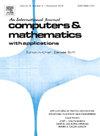Analysis of H1 penalized fictitious domain method for parabolic problems
IF 2.5
2区 数学
Q1 MATHEMATICS, APPLIED
引用次数: 0
Abstract
This work focuses on establishing optimal a priori error estimates and stability analysis for penalized fictitious domain method for parabolic problems defined over curved complex domains. We embed the given complicated domain Ω into a larger rectangular domain R and extend the governing equation to a rectangular domain R by employing penalty parameter ϵ in the fictitious part . Considering the inherent characteristic of the penalty, in the variational formulation, we impose the penalty only on the elliptic part and evince that the solution of the new penalized problem converges to the original solution. In order to obtain a numerical solution to the penalized problem, for spatial discretization, we utilize linear-finite elements on structured triangular mesh irrespective of the shape of the domain, and an Euler backward scheme is employed for the discretization of time space. Convergence analysis and discrete stability estimates are derived for semi and fully-discrete schemes. Moreover, numerical experiments are accomplished to validate the theoretical convergence rate and examine the computational efficiency of the proposed method.
抛物型问题的H1罚虚域法分析
本文的工作重点是建立最优的先验误差估计和稳定性分析的H1惩罚虚域方法的抛物线问题定义在弯曲的复域。我们将给定的复杂域Ω嵌入到更大的矩形域R中,并通过在虚拟部分R\Ω中使用惩罚参数λ,将控制方程扩展到矩形域R。考虑到H1惩罚的固有特性,在变分公式中,我们只对椭圆部分施加H1惩罚,并证明了新惩罚问题的解收敛于原解。为了得到惩罚问题的数值解,对于空间离散化,我们在结构三角形网格上使用线性有限元,而不考虑域的形状,并采用欧拉倒推格式进行时间空间离散化。给出了半离散和全离散格式的收敛性分析和离散稳定性估计。通过数值实验验证了该方法的理论收敛速度和计算效率。
本文章由计算机程序翻译,如有差异,请以英文原文为准。
求助全文
约1分钟内获得全文
求助全文
来源期刊

Computers & Mathematics with Applications
工程技术-计算机:跨学科应用
CiteScore
5.10
自引率
10.30%
发文量
396
审稿时长
9.9 weeks
期刊介绍:
Computers & Mathematics with Applications provides a medium of exchange for those engaged in fields contributing to building successful simulations for science and engineering using Partial Differential Equations (PDEs).
 求助内容:
求助内容: 应助结果提醒方式:
应助结果提醒方式:


